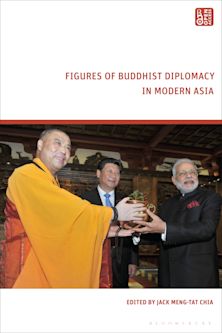- Home
- ACADEMIC
- Politics & International Relations
- Asian Politics
- Taiwan at a Tipping Point
Taiwan at a Tipping Point
The Democratic Progressive Party's Return to Power
Taiwan at a Tipping Point
The Democratic Progressive Party's Return to Power
For information on how we process your data, read our Privacy Policy
Thank you. We will email you when this book is available to order
You must sign in to add this item to your wishlist. Please sign in or create an account
Description
Taiwan at a Tipping Point assesses issues relating to Taiwan’s new political, economic, diplomatic and military/strategic state-of-affairs following the January 2016 national election that brought the then opposition Democratic Progressive Party (DPP) to power. This was a momentous event. The DPP won major presidential and legislative victories giving it an easy mandate to govern. Tsai Ing-wen became president. But ruling did not turn out to be easy. Tsai and the DPP had little experience managing the economy and their growth strategies did not work well. Their stances on Taiwan’s independence alienated Taiwan’s biggest trading partner and a nation that claims Taiwan is its territory, China. Beijing took revenge. Taiwan’s only ally, the United States, was confused and distracted in trying to formulate a new policy toward Taiwan. Promises President Tsai and the DPP made during the campaign, especially on reform and Taiwan’s national status, were hard to fulfill and for the most part were not. Post-election euphoria turned into dismay. Thus the question arose whether the president and the DPP would remain in power or whether the next elections would see the Nationalist Party or Kuomintang (KMT) return—though it remaining in the doldrums made this seem unlikely. Thus uncertainty characterized Taiwan post-election. Taiwan was at a turning point.
Table of Contents
Chapter 2: Taiwan’s 2014 Nine-in-One Election
Chapter 3: Taiwan’s 2016 Presidential/Vice Presidential and Legislative Election
Chapter 4: Conclusions and Forecasts
Product details
| Published | Nov 30 2017 |
|---|---|
| Format | Ebook (Epub & Mobi) |
| Edition | 1st |
| Extent | 274 |
| ISBN | 9781498569705 |
| Imprint | Lexington Books |
| Publisher | Bloomsbury Publishing |
About the contributors
Reviews
-
Taiwan at a Tipping Point is a very timely book, given the political, economic, and diplomatic uncertainties facing that country. John F. Copper presents a sophisticated analysis of recent economic trends and domestic politics in Taiwan, and of the roles that China and the United States are playing in the evolving situation. This study will be valuable to those interested in Taiwan, China, and US diplomacy.
Cal Clark, Auburn University
-
After eight years of relative calm and tranquility, the so-called ‘Taiwan question’ has reemerged as one of the most serious challenges to peace and stability in the Western Pacific. In his new book, John F. Copper seeks to help readers make sense of the stunning electoral victory of the independence-leaning Democratic Progressive Party in the island’s 2016 elections. Having never been concerned with being ‘politically correct,’ Copper’s conclusions provide us with a sobering and objective assessment of the Tsai administration’s uneven performance and the many challenges that the people of Taiwan must now confront. As such, the book should have a broad appeal to both practitioners and serious academics
Dennis V. Hickey, Missouri State University
-
John F. Copper, a world recognized expert on Taiwan, has written a definitive study of political change in Taiwan since 2014. If one wants to acquire background and incisive, balanced political analysis of contemporary Taiwan, this is the book to read. This excellent study is complemented by a superb writing style.
Thomas J. Bellows, University of Texas at San Antonio
-
John F. Copper has a welcome talent for tackling complicated and sensitive issues in plain language. His latest book on Taiwan politics is no exception. In flowing prose, he examines the intricacies of Taiwan's elections and analyzes their wider implications involving China and the United States. This is a book for both specialists and interested general readers.
Ta-ling Lee, Southern Connecticut State University
-
John F. Copper is a very serious scholar. This study, both in terms of breadth and depth—packed with hundreds of useful endnotes—should be mandatory reading for all Taiwan area specialists.
Peter Kien-hong Yu, National Quemoy University
-
In sum, this is a classical book which records the transfer of political power from the DPP to the KMT and back again in detail, giving the readers a comprehensive understanding of how the DPP regained its glory, political power, and socioeconomic environment during these years. The author’s hard work helps us to know how and why the voters’ choice changed dramatically from 2008 to 2016. This book is worth the read both for newcomers and experienced researchers of Taiwanese politics. It offers fruitful information and details about the political and social environmental changes in Taiwanese democratic development movements. The insights offered by the author also help researchers to catch how the Taiwanese voters’ preferences on party and its candidates changed during recent decades and why Taiwan is “at a tipping point.”
China Review International

ONLINE RESOURCES
Bloomsbury Collections
This book is available on Bloomsbury Collections where your library has access.



































